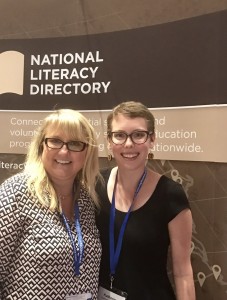Guest Post: Urban Peak at COABE
Last month, the National Literacy Directory awarded two Innovation Grant scholarships to Directory program representatives to attend Coalition for Adult Basic Education’s (COABE) conference in April. COABE is an affiliate partner of the Directory. The Directory’s Innovation Grant series recognizes and rewards innovative literacy and education programs that are finding solutions to persistent challenges. In this guest post, Innovation Grant winner Katherine Whelan reflects on her COABE conference experience.
I wear a lot of hats at Urban Peak, a non-profit organization that works with homeless and at-risk youth and young adults in Denver, Colorado. I oversee our education and training programs, tutor students, supervise full-time and part-time volunteers, and act as a support and advocate for our students. I’ve been unable to attend conferences in the past due to a lack of funding, so I was extra excited to receive the National Literacy Directory’s Innovation Grant to attend the COABE conference! I felt like a child visiting Disney World for the first time (I did arrive in Orlando a day early to visit Harry Potter world for the first time, but that’s a different story).
 I woke up early Monday morning, having planned out all of the sessions I was going to attend over the next three days (I tried to carry over some of the magic I’d learned in Harry Potter World so I could attend two sessions at once, but alas, it turns out I’m a muggle after all…). My eyes were opened to the vast world of adult education. I mean, what an amazing group of people! The conference was overflowing with dedicated educators and passionate advocates. I attended sessions on volunteer training, WIOA funding, student retention, teaching GED® math, free online resources for students, and education for homeless individuals. I literally got writer’s cramp from taking notes on how to bring this knowledge back to Urban Peak.
I woke up early Monday morning, having planned out all of the sessions I was going to attend over the next three days (I tried to carry over some of the magic I’d learned in Harry Potter World so I could attend two sessions at once, but alas, it turns out I’m a muggle after all…). My eyes were opened to the vast world of adult education. I mean, what an amazing group of people! The conference was overflowing with dedicated educators and passionate advocates. I attended sessions on volunteer training, WIOA funding, student retention, teaching GED® math, free online resources for students, and education for homeless individuals. I literally got writer’s cramp from taking notes on how to bring this knowledge back to Urban Peak.
I could rant for pages, but I want to highlight one of the most important takeaways from the conference: suggestions for helping students overcome the GED Math test, which is the biggest barrier for many of my students. Two sessions in particular gave me some great ideas to bring back to my classroom. I attended a session put on by Eric Appleton and Mark Trushkowsky from City University of New York (CUNY). They introduced us to the FREE lesson plans and materials that CUNY offers online. They used a sample lesson during their presentation – it was helpful to see how they implement the materials, plus we got to work on functions during the session (my inner math nerd was geeking out about this!). Functions are one of the hardest concepts to teach students and I really like the way they break it down. I am beginning to work their lessons into my tutoring and I have high hopes that this is going to tremendously help students grasp the concept of functions, which is integral to the GED Math test.
I booked a flight for late Wednesday night so I could attend the last session of the conference: Open Dialogue on What to Teach in the GED® Classroom (Math Edition), presented by Cheyenne Tuller of Londer Learning Center in Oregon. It was completely worth the late-night flight! Cheyenne and her colleague have figured out a way to fast track many of their students for the GED Math test; i.e., cut out many sections and focus only on the most important concepts, or the concepts that appear the most in the test. I do this informally with students on a case-by-case basis, but I’m excited to rework our curriculum to have a consistent fast track option for students. I’ve been pondering how to change our math instruction for ages, and it was extremely helpful to see what another adult education program has already cut and to know that it’s worked really well for them thus far. I want to sincerely thank the National Literacy Directory for affording me this opportunity. It has already benefitted me personally and I’m really looking forward to seeing how these ideas help my students pass the GED test (math especially!) quicker and with more confidence.
Add your program to the National Literacy Directory for free by clicking here. Innovation Grants are announced periodically throughout the year and are available to programs with up-to-date member profiles listed in the National Literacy Directory and to organizations that complete a free Directory profile as part of the grant application process. Add your program for free at www.nationalliteracydirectory.org/register.